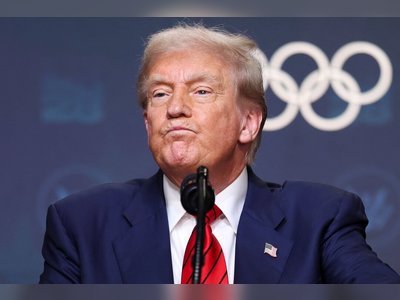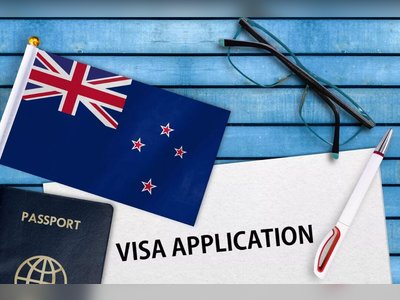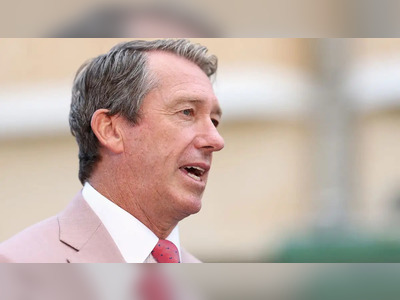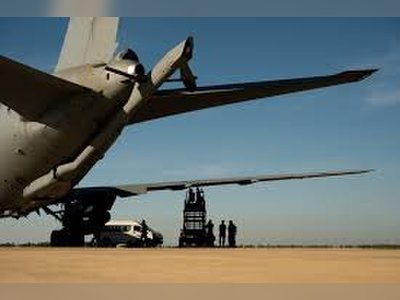Albanese and Trump Discuss Australia-US Defence Relations amid Strategic Challenges
Anthony Albanese seeks to reassure Trump of Australia's partnership in the Indo-Pacific while addressing defence spending concerns during a pivotal meeting at the G7 summit.
CALGARY: Australian Prime Minister Anthony Albanese is set to engage with former U.S. President Donald Trump this week in a significant meeting aimed at reinforcing Australia’s role as a strategic partner for the United States amid growing concerns over China's military expansion.
This encounter will take place on the sidelines of the G7 summit in Canada, where leaders will also address pressing global issues, including the ongoing conflicts in Ukraine and the Middle East.
In pre-meeting statements, Albanese is expected to confront Trump's suggestion that Australia should double its defence spending, a demand that has emerged as both nations navigate the complexities of their alliance within the framework of the AUKUS pact.
AUKUS, a trilateral security agreement involving Australia, the UK, and the US, is pivotal for defence cooperation, particularly in countering regional threats, including those posed by China's assertive military posture.
During the meeting, which falls within a crucial window of international diplomacy, Albanese plans to emphasize Australia's reliability as a partner in maintaining peace and security in the Pacific region.
His administration underscores its commitment to promoting regional stability, particularly as Australia recently strengthened ties with Pacific nations, evidenced by a diplomatic visit to Fiji.
While Albanese refrained from speculating on Australia’s military response should China act against Taiwan, he asserted that AUKUS remains a cornerstone of peace in the region.
"Australia’s a trusted partner to promote peace and security in our region," Albanese stated, indicating that the meeting serves as an opportunity to convey Australia’s strategic interests directly to Trump.
The scheduled meeting has garnered attention for its potential long-term implications, with Australian officials indicating that a discussion lasting over 20 minutes would be considered a success.
Previously, Trump has utilized such engagements to generate media attention, which adds a layer of unpredictability to the diplomatic interaction.
In addition to discussing defence spending—which currently stands at around 2% of Australia’s GDP with plans to raise it to 2.3%—Albanese is likely to present Australia’s critical minerals as a vital contribution to the U.S. economy.
Discussions on security cooperation may also touch upon the recent remarks by U.S. Defence Secretary Pete Hegseth, who suggested a substantial increase in Australian defence investment, aiming for approximately 3.5% of GDP.
In preparation for the summit, Albanese conferred with Canadian Prime Minister Mark Carney to explore advancements in defence collaboration, particularly related to Canada’s acquisition of an Australian radar system that taps into deeper technological ties under AUKUS's second pillar focused on advanced technology.
This move reflects a strategic push by both nations towards enhancing their military capabilities amid evolving global threats, especially in the Arctic region.
As the conversation at the G7 unfolds, other notable leaders are also participating, including the Prime Ministers of the UK, Japan, Germany, and the Presidents of France and South Korea.
With the G7 not issuing a traditional joint communique this year, discussions surrounding tariffs, economic impacts, and the geopolitical landscape will likely shape the dialogue.
Albanese has articulated a firm stance against tariffs, referring to them as "acts of economic self-harm" and stressing that they increase costs without providing tangible benefits to the economy.
The discussion's context is underscored by the ongoing military and economic competition with China.
Ahead of the summit, Carney's recent electoral success in Canada, bolstered by distancing from Trump’s policies, sets a contrasting backdrop for Albanese’s attempt to navigate U.S.-Australia relations, which are currently facing unprecedented challenges.
As political tensions fluctuate, Australia’s participation in the G7 alongside countries such as Brazil, India, Mexico, South Africa, and Ukraine as an outreach partner reflects its commitment to engage on the global stage.
This encounter will take place on the sidelines of the G7 summit in Canada, where leaders will also address pressing global issues, including the ongoing conflicts in Ukraine and the Middle East.
In pre-meeting statements, Albanese is expected to confront Trump's suggestion that Australia should double its defence spending, a demand that has emerged as both nations navigate the complexities of their alliance within the framework of the AUKUS pact.
AUKUS, a trilateral security agreement involving Australia, the UK, and the US, is pivotal for defence cooperation, particularly in countering regional threats, including those posed by China's assertive military posture.
During the meeting, which falls within a crucial window of international diplomacy, Albanese plans to emphasize Australia's reliability as a partner in maintaining peace and security in the Pacific region.
His administration underscores its commitment to promoting regional stability, particularly as Australia recently strengthened ties with Pacific nations, evidenced by a diplomatic visit to Fiji.
While Albanese refrained from speculating on Australia’s military response should China act against Taiwan, he asserted that AUKUS remains a cornerstone of peace in the region.
"Australia’s a trusted partner to promote peace and security in our region," Albanese stated, indicating that the meeting serves as an opportunity to convey Australia’s strategic interests directly to Trump.
The scheduled meeting has garnered attention for its potential long-term implications, with Australian officials indicating that a discussion lasting over 20 minutes would be considered a success.
Previously, Trump has utilized such engagements to generate media attention, which adds a layer of unpredictability to the diplomatic interaction.
In addition to discussing defence spending—which currently stands at around 2% of Australia’s GDP with plans to raise it to 2.3%—Albanese is likely to present Australia’s critical minerals as a vital contribution to the U.S. economy.
Discussions on security cooperation may also touch upon the recent remarks by U.S. Defence Secretary Pete Hegseth, who suggested a substantial increase in Australian defence investment, aiming for approximately 3.5% of GDP.
In preparation for the summit, Albanese conferred with Canadian Prime Minister Mark Carney to explore advancements in defence collaboration, particularly related to Canada’s acquisition of an Australian radar system that taps into deeper technological ties under AUKUS's second pillar focused on advanced technology.
This move reflects a strategic push by both nations towards enhancing their military capabilities amid evolving global threats, especially in the Arctic region.
As the conversation at the G7 unfolds, other notable leaders are also participating, including the Prime Ministers of the UK, Japan, Germany, and the Presidents of France and South Korea.
With the G7 not issuing a traditional joint communique this year, discussions surrounding tariffs, economic impacts, and the geopolitical landscape will likely shape the dialogue.
Albanese has articulated a firm stance against tariffs, referring to them as "acts of economic self-harm" and stressing that they increase costs without providing tangible benefits to the economy.
The discussion's context is underscored by the ongoing military and economic competition with China.
Ahead of the summit, Carney's recent electoral success in Canada, bolstered by distancing from Trump’s policies, sets a contrasting backdrop for Albanese’s attempt to navigate U.S.-Australia relations, which are currently facing unprecedented challenges.
As political tensions fluctuate, Australia’s participation in the G7 alongside countries such as Brazil, India, Mexico, South Africa, and Ukraine as an outreach partner reflects its commitment to engage on the global stage.
AI Disclaimer: An advanced artificial intelligence (AI) system generated the content of this page on its own. This innovative technology conducts extensive research from a variety of reliable sources, performs rigorous fact-checking and verification, cleans up and balances biased or manipulated content, and presents a minimal factual summary that is just enough yet essential for you to function as an informed and educated citizen. Please keep in mind, however, that this system is an evolving technology, and as a result, the article may contain accidental inaccuracies or errors. We urge you to help us improve our site by reporting any inaccuracies you find using the "Contact Us" link at the bottom of this page. Your helpful feedback helps us improve our system and deliver more precise content. When you find an article of interest here, please look for the full and extensive coverage of this topic in traditional news sources, as they are written by professional journalists that we try to support, not replace. We appreciate your understanding and assistance.











